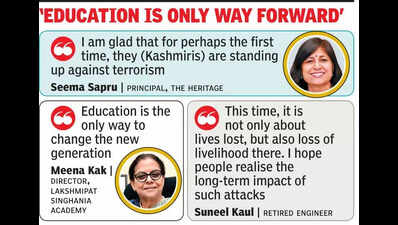- News
- City News
- kolkata News
- Carnage evokes deja vu for Kol Kashmiri Pandits
Trending
Carnage evokes deja vu for Kol Kashmiri Pandits
Kashmiri Pandits in Kolkata emphasized the importance of education and local unity to transform the Valley, recalling the violence that forced them to flee decades ago. The recent Pahalgam killings have revived painful memories, but there's optimism as local Kashmiris now speak out against terrorism, a stark contrast to the past when terrorists had support.
KOLKATA: Educational advancement, coupled with local unity, was essential to transform the situation in the Valley, pointed out Kashmiri Pandits in Kolkata, as they relived the horrors they faced back in Kashmir decades ago.
The Pahalgam killings have revived the memories of violence that Kashmiri Pandits witnessed in the 1980s and 1990s before they were forced to leave their hometowns. Meena Kak, director of Lakshmipat Singhania Academy, said her family had to abandon their home in Gulmarg in the '90s. "It's painful that this happened when everything was finally settling down. My relatives had started visiting, my son was there about seven-eight months ago.. It's unbelievable that it has happened now after so many years," said Kak.
You Can Also Check: Kolkata AQI | Weather in Kolkata | Bank Holidays in Kolkata | Public Holidays in Kolkata
She shared the tragic account of her father's younger brother being killed and buried in their courtyard and her family learning about it two weeks later. Kak's parents were from Malmu village, where her father was the first graduate. Her uncle had to wrap his textile business and leave as local workers prevented him from procuring materials, she said.
The Heritage School principal Seema Sapru, also a Kashmiri Pandit, expressed optimism with local Kashmiris speaking up against terrorism. She recounted childhood memories near Lal Chowk at her grandfather's house. "Kashmir is a beautiful place with immense tourism potential, which has remained unexplored due to insurgency and conflict. The people of Kashmir have stayed quiet for too long. I am glad that for perhaps the first time, they are standing up against terrorism. This is starkly different from the scene in 1990s and 2000s, when terrorists controlled the narrative and received support from a section of locals. The boom in the economy has made people realise what normal life can be and that has turned the tide," Sapru said.
Suneel Kaul, a retired engineer at Eveready Industries, views the attack as a crucial moment for national awareness on terrorism. "I hope the nation wakes after this incident," he said. "We were thrown out of our houses, people forgot after some time. I hope the same thing does not happen again. This time, it is not only about lives, but also livelihood. I hope people realise its long-term impact."
End of Article
Follow Us On Social Media










